Becoming an adult is an important rite of passage in any culture. In Chinese culture, turning 20 marks the transition to the adult world. The celebrated Zen drumming performance group U-Theatre turns 20 this year and the company has come up with an unusual way of celebrating with its fans, supporters and everyone else in Taiwan and yet keeping to its austere meditation-oriented image. It's going on a walkabout.
A very long walk. Around Taiwan.
Fifty days, 100 townships, 1,200km, plus about 30 performances big and small along the way. After all, this is a company whose motto could be summed up as "no pain, no gain."
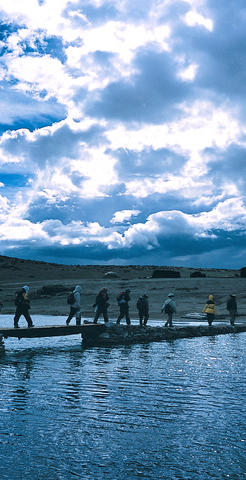
PHOTO: COURTESY OF U-THEATRE
The company, founded by Liu Ruo-yu (劉若瑀), is internationally renowned for its drumming, thanks to the work of drumming master and musical director Huang Chih-chun (黃誌群).
In Taiwan, it is also known for taking very long walks. In 1996, the troupe walked from Kenting to Taipei, a 28-day journey. The following year, they walked from Ilan to Taipei. In 2003, they went to Tibet, where they walked the traditional pilgrims' path to and around Mount Kailash, the mountain revered by Hindus, Buddhists and others as the heart of the universe.
Company manager Ken Kuo (郭耿甫) said he was in Singapore in January when he got the idea of staging a birthday walk.
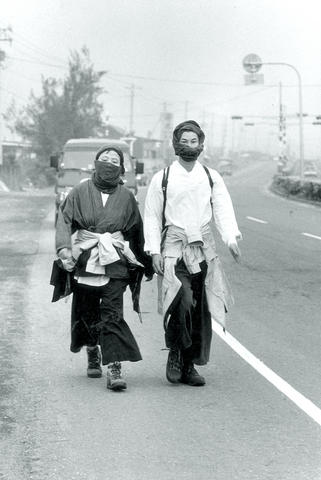
PHOTO: COURTESY OF U-THEATRE
"I was checking my e-mail and the Internet and saw the news that some people were walking in Taiwan [for the Democratic Progressive Party]," he said in an interview on March 15. "But our walk will be very different. We will bring our drums; we want to make connections - for the environment, for education - to inspire people."
"The first two walks were quiet; we just stayed in temples. Now we are an adult, we want to do something for the people, to make a bigger sound this time," he said.
The company hopes its walk will help inspire people to make a commitment to improve their lives, their communities, the country, to show they care. U-Theatre wants to show people that there are some things they can devote their time to, their lives to, he said.

PHOTO: COURTESY OF U-THEATRE
"All the people are doing this to make Taiwan better. We want to use the 50 days to tell people 'just do it,'" Kuo said, using the catchphrase made famous by Nike.
So U-Theatre has invited its friends and fans to join the troupe on the walk, either for a few hours, a few days, or for a hardy few (the limit is 10) the entire 50 days. Kuo said the best leg for people who want to join the walk would be the fourth section from Hualien to Taitung.
"There is little traffic, the landscape is better, so we are open for people to join us for four or five days there. There is a charge of NT$500 per day to cover the cost of food and accommodation," Kuo said. "Or they can come and walk for just a little while."
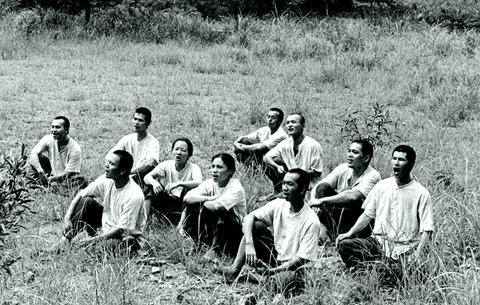
PHOTO: COURTESY OF U-THEATRE
The company will post the starting point for each day's walk on its Web site (www.utheatre.org.tw), although only on the Chinese-language page.
U-Theatre has had a relatively short period of time to pull this project together, but Kuo said people and companies around the country have been calling up with offers to help.
"We got a lot of phone calls, lots of people saying they want to help, offering free accommodation, like a B&B [bed-and-breakfast] in Hualien, or offering to arrange the food. People have also volunteered to find sponsors for the walk or offered to drive the support vehicles," he said.
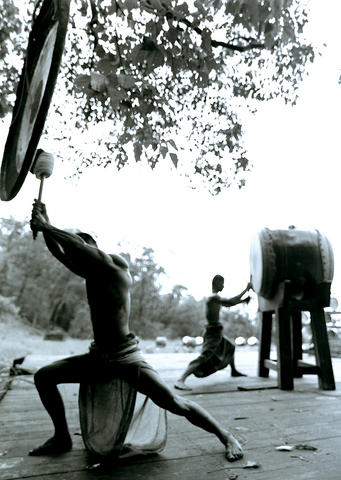
PHOTO: COURTESY OF U-THEATRE
The Eslite Books chain store offered to host a photographic exhibition of U-Theatre's performances at some of its premises in Taipei, Taitung and Tainan. The company also has outfitted a truck to turn it into a traveling bookstore that will follow the company on the walk, taking books into small towns that don't have an Eslite branch.
"We just got the offer from Eslite one month ago, so we had a very short time to find a designer [to mount an exhibit]. I got the idea to use university students because students at a university in Taichung had already asked us about scheduling a stop at their school," Kuo said. "The first exhibit was pulled together in two weeks."
While the show in Taipei was up for just one week and closes tomorrow, the Eslite branch in Taitung will host the exhibit from April 4 to April 20 and the Tainan branch will host it from April 25 to May 11.
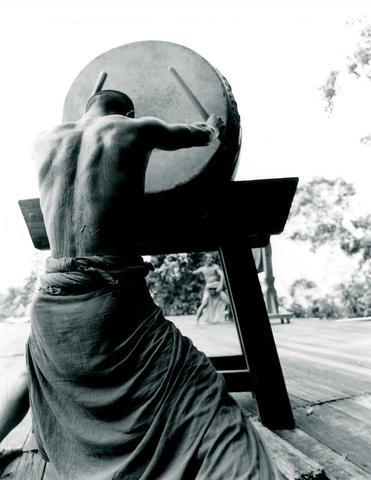
PHOTO: COURTESY OF U-THEATRE
The PCA Life Assurance company is contributing both walkers on the first full day of the walk and sponsoring a performance in Nantou on the return leg of the journey. The head of the company was in the audience for the performance U-Theatre gave in Taipei's Da'an Forest Park to mark the conclusion of its 1996 walk and she has been a fan ever since.
"They [the insurance firm] have been supporting an orphanage in Nantou for a year and in three years she [the firm's president] wants to raise NT$15 million [US$489,000] for the orphanage. So we are very happy to be a partner with them," Kuo said, citing the company as an example of people and groups who are doing something for their community.
U-Theatre will kick off its birthday tour tomorrow when its members walk from the group's home on Laoquanshan (老泉山) in Muzha to the Eslite bookstore on Dunhua South Road, where the walkers are expected to arrive at 11am. At 2:30pm there will be a small ceremony to formally start the expedition. The company will then walk to Da'an Forest Park, where at 7:30pm its members will perform what Kuo calls "a small gathering, not a full performance."
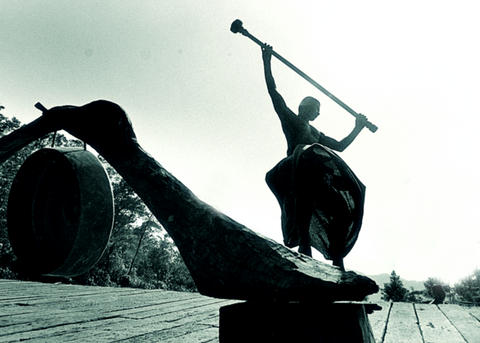
Going to Da'an Forest Park was important because it was the ending point for the troupe's first big walk in 1996, so it seemed the right place to begin the new circle that is this year's walk.
U-Theatre members will then return home to get ready to hit the road for real on Monday, heading to Ilan. They will head down the east coast to Hualien and Taitung before cutting through the mountains to Pintung County and then onto Kaohsiung, the halfway point.
The company is working with the national Police Radio Station [警廣, FM104.9] to help ensure the safety of the walkers. The station will be giving traffic reports, telling drivers where the company is heading and what road they are walking on. It will also announce the performances.
For fans that just want to see and hear the troupe, there will be several opportunities over the next month and a list of the shows is posted on the U-Theatre Web site.
The company has revived its 1996 production Sound of the Ocean (聽海之音) for this tour and there will be a full performance in Kaohsiung on April 19 to mark the halfway point in the walk and one on May 11 in the Taiwan Democracy Memorial Plaza in Taipei City to mark the journey's end. Excerpts from the five-part show will be performed in smaller venues along the way.
This year's walk will be a challenge, Kuo said, but it is meant to be uplifting.
"We want people to enjoy it, so we are calling it 'A Cloud Walk,'" he said.

May 18 to May 24 Pastor Yang Hsu’s (楊煦) congregation was shocked upon seeing the land he chose to build his orphanage. It was surrounded by mountains on three sides, and the only way to access it was to cross a river by foot. The soil was poor due to runoff, and large rocks strewn across the plot prevented much from growing. In addition, there was no running water or electricity. But it was all Yang could afford. He and his Indigenous Atayal wife Lin Feng-ying (林鳳英) had already been caring for 24 orphans in their home, and they were in

On May 2, Chinese Nationalist Party (KMT) Chairman Eric Chu (朱立倫), at a meeting in support of Taipei city councilors at party headquarters, compared President William Lai (賴清德) to Hitler. Chu claimed that unlike any other democracy worldwide in history, no other leader was rooting out opposing parties like Lai and the Democratic Progressive Party (DPP). That his statements are wildly inaccurate was not the point. It was a rallying cry, not a history lesson. This was intentional to provoke the international diplomatic community into a response, which was promptly provided. Both the German and Israeli offices issued statements on Facebook

President William Lai (賴清德) yesterday delivered an address marking the first anniversary of his presidency. In the speech, Lai affirmed Taiwan’s global role in technology, trade and security. He announced economic and national security initiatives, and emphasized democratic values and cross-party cooperation. The following is the full text of his speech: Yesterday, outside of Beida Elementary School in New Taipei City’s Sanxia District (三峽), there was a major traffic accident that, sadly, claimed several lives and resulted in multiple injuries. The Executive Yuan immediately formed a task force, and last night I personally visited the victims in hospital. Central government agencies and the

Australia’s ABC last week published a piece on the recall campaign. The article emphasized the divisions in Taiwanese society and blamed the recall for worsening them. It quotes a supporter of the Taiwan People’s Party (TPP) as saying “I’m 43 years old, born and raised here, and I’ve never seen the country this divided in my entire life.” Apparently, as an adult, she slept through the post-election violence in 2000 and 2004 by the Chinese Nationalist Party (KMT), the veiled coup threats by the military when Chen Shui-bian (陳水扁) became president, the 2006 Red Shirt protests against him ginned up by